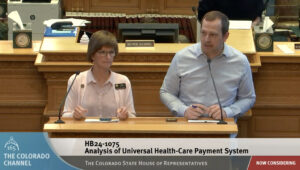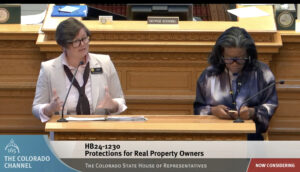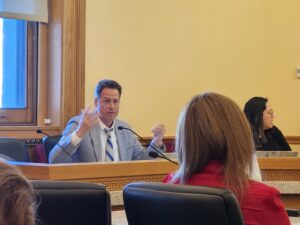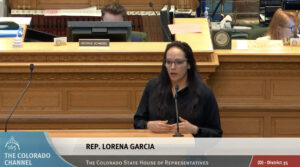Colorado legislators allowed the clock to run out on four bills Tuesday that critics warned would raise the already high cost of living, including another study that would have asked officials to develop model legislation for implementing a single-payer health system.
All four of the deaths came on the next-to-last day of the 2024 session, when most of the attention fell on high-profile items clearing key or final hurdles as the 120-day session prepares to end Wednesday. Those included advancement of a $1.3 billion property-tax reduction bill, final passage of a compromise bill to raise caps for noneconomic damages in lawsuits and final approval of much of Gov. Jared Polis’ affordable-housing package.
But for business leaders, the lack of votes received by four bills that will not be discussed on the final day of the session also carried significant weight as they fight to keep down costs of doing business and make Colorado more attractive for economic development. Those bills were:
- House Bill 1075, an effort to study creation of a health-care system in which the state determines provider compensation and is responsible for paying all of it out;
- HB 1230, which sought to roll back protections for builders against lawsuits;
- Senate Bill 54, which would have required health-insurance coverage of high-dollar obesity drugs; and,
- HB 1245, which would have required the state pay prevailing wage levels to contractors installing broadband infrastructure with federal funding.
Single-payer study
HB 1075 was of particular concern to health-insurers, some health-care providers and employers, as it sought to pay the Colorado School of Public Health $240,000 to create model legislation for implementation of a Canada-style single-payer health system. It passed the House on April 22 on a largely party-line vote and advanced through two Senate committees in the past week, but it never came up for Senate debate — for the second year in a row.

Colorado state Rep. Andy Boesenecker speaks about his single-payer study bill on the House floor while cosponsoring Rep. Karen McCormick listens on Saturday.
Republicans had made the bill a top target because they felt that the language of HB 1075 set the study up to be greased to have a very pro-single-payer-system bias, down to the makeup of the collaborative set to discuss it. With two bills, including HB 1075, still needing preliminary approval by midnight Tuesday, they went into discussions with Democratic Senate leaders shortly before 8 p.m. threatening a filibuster and got the bills postponed, ending their pathways to passage.
“There was a predetermined outcome spelled out in this bill, and it would have laid the groundwork for billions of dollars in payroll taxes on Colorado’s workforce and business community,” said Meghan Dollar, senior vice president of governmental affairs for the Colorado Chamber of Commerce. “Colorado voters have already resoundingly rejected this kind of disruption to our health-care system, and the defeat of HB 1075 will help preserve Colorado’s economic competitiveness and business climate.”
Construction-defects reform competitor
HB 1230, introduced in the same session as the most substantial effort since 2017 to limit the frequency and intensity of lawsuits against condominium builders, was in many ways the opposite of that bill, SB 106. It would have enabled more lawsuits by extending from six to 10 years the statute of repose on construction defects, added prejudgment interest for plaintiffs and let neighborhood associations file defects legal actions on behalf of single-family homes for the first time.
As incompatible as the two bills seemed, the Senate Local Government & Housing Committee managed to pass both bills at separate times, and HB 1230 had sat poised for full Senate debate since April 19, even if its passage seemed unlikely. However, after the House sponsor of SB 106 killed that bill Friday because she could not find a path to success in that more liberal chamber, HB 1230 quietly faded out as expected in the moderate Senate.

Colorado state Rep. Jennifer Parenti listens as Rep. Jennifer Bacon speaks on House Bill 1230.
SB 54, which sought to require state-regulated health insurers and Medicaid to cover anti-obesity treatments and medications including pricey drugs Ozempic and Wegovy, caught fire late in the session, clearing the Senate in bipartisan fashion on April 30. Supporters argued that while the medications are very costly — North Carolina removed them from its state employees’ health plan because it risked going broke — their ability to cut costs for treatment of diabetes and other diseases would create long-term savings.
Obesity treatment mandate
But one of the bill’s biggest opponents was Polis’ administration — specifically the Colorado Department of Health Care Policy and Financing, which helped estimate the bill would add $200 million in costs in its first full year and said such funding didn’t exist.
Polis reportedly also worried about the costs to private insurance plans, as brokers estimated it could raise all individual and small-group premiums by up to $12 a month, regardless of whether someone used the treatment. So, even though SB 54 advanced through the House Health & Human Services Committee on a Democratic-led, party-line vote Thursday, it never made it onto a proposed House Appropriations Committee calendar before time ran out on it Tuesday night.

Colorado state Sen. Jim Smallwood questions Sen. Dafna Michaelson Jenet about her obesity-treatment bill in the Senate Health & Human Services Committee on April 11.
Legislators from both parties appeared conflicted about the bill, saying that they believed it could have tremendous impacts but never saw financial analyses showing that savings could offset the high near-term costs of investing in the drugs. Rep. Eliza Hamrick, D-Centennial seemed to encapsulate that feeling in comments she made supporting the bill in the health committee.
“I’m also concerned about this fiscal note, but I’m kind of thinking ‘Kick it to Appropriations and hope they’ll do their jobs,’” Hamrick said before casting her ‘yes’ vote.”
Broadband prevailing wage
Similarly, HB 1245 lingered for two months before the House Business Affairs & Labor Committee gave the measure its first approval on April 17, and then sponsors pushed it through the House and its first Senate committee over the next two-and-a-half weeks. However, while it was on the Senate Appropriations Committee calendar Tuesday, it did not get a hearing, costing it any chance of getting its needed final two votes from the Senate.

Colorado state Rep. Lorena Garcia speak on the House floor about her bill to pay prevailing wage to state broadband contractors.
Sponsored by Democratic Reps. Tammy Story of Conifer and Lorena Garcia of Adams County, it sought to require the state pay prevailing wage — a typically higher rate of compensation determined by the U.S. Department of Labor — to contractors installing broadband. The federal government announced Colorado will get $826 million in funds over the next four years to expand fiber, and Story told the business committee the bill would ensure it would “be done the right way and not hire unskilled, untrained laborers who don’t get paid living wage (and) who then become unreliable.”
But the Colorado Broadband Office pushed back against the bill, warning that changes in its spending plan that would be required by HB 1245 would push it to the back of the line for federal proposal evaluation and delay getting funds and starting work. Republicans also worried the requirement would leave less money to get work done and cause some communities to remain unconnected, and also that that it would cost the CBO money to set up enforcement units to ensure the proper wages are paid.
